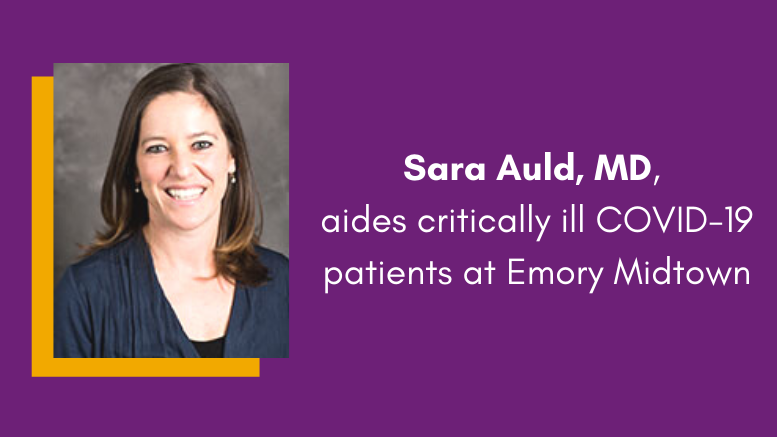Before the COVID-19 pandemic impacted the world, Sara Auld, MD, split her time between clinical work in the medical ICU and pulmonary consult service at Emory Midtown. She also conducted research in global Tuberculosis and HIV at the Rollins School of Public Health. Now, Auld has paused much of her usual research to help on several fronts related to the coronavirus.
An assistant professor of in the Division of Pulmonology, Allergy, Critical Care, and Sleep Medicine, Auld currently focuses her efforts on developing institutional guidelines for the care of critically ill patients. These guidelines have been put together by a collaborative group within the departments of medicine, surgery, anesthesia, and pharmacy to serve as a guide on critical care when there is very little data available to assist physicians.
Auld also leads a research initiative that aims to understand how COVID-19 impacts the ICU population. The research platform, the Emory Quality and Clinical Research Collaborative (QCRC), provides comprehensive data on patients admitted to Emory ICUs to enable observational research by Emory-affiliated faculty and staff. They have fielded more than forty initial proposals and have now shared data with investigators. The collaborative is leading more than twenty studies looking at different aspects of COVID-19 in the critically ill populations.
While Emory continues to make strides in COVID-19 research, Auld says there is a constant state of recalibrating based on daily changes and challenges. She is also greatly concerned for the mental health of all healthcare professionals as cases continue to increase.
“I am very worried about burnout amongst healthcare workers,” said Auld. “Our teams have been caring for patients with COVID-19 for nearly five months now, without a break, while also trying to navigate the multitude of stresses that COVID-19 has placed on everyone’s lives outside of work. People are simply exhausted, physically and emotionally, and it is daunting to think that we are on the crest of another surge with no end in sight.”
Auld’s concerns are common among healthcare professionals and Emory is committed to providing the necessary resources to support physicians during this stressful time. Physicians are encouraged to utilize the Faculty Staff Assistance Program that provides ongoing virtual debriefing and support sessions. Other Emory wellness offerings include the Healthy Emory Connect program, that encourages physical activity with incentives, and virtual fitness classes through Blomeyer. The Department of Medicine’s Office of Faculty Development also created a website with a multitude of resources for faculty and the School of Medicine has brought physician burnout issues to light as well.
As she reflects on this challenging time, Auld says she is incredibly proud of how the ICU teams and Emory healthcare community have come together. She also encourages the public to show appreciation toward all those on the front lines as they continue to selflessly serve.
“The ongoing support of the Emory community, both in principle and in practice, means a lot to those who are truly on the front lines of this pandemic,” said Auld. “Please keep thanking your healthcare workers, nurses, therapists, technicians, and more, as they are the ones doing the hard work, day in and day out.”


Be the first to comment on "Sara Auld, MD, aides critically ill COVID-19 patients at Emory Midtown"